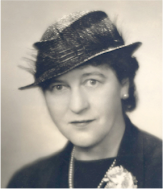Margaret Ayer Barnes
Margaret Ayer Barnes (1886-1967) was a Pulitzer Prize-winning author and playwright. Born in Chicago, Illinois in 1886, she took an interest in writing and theater at a young age. Margaret attended Bryn Mawr College and obtained her Artium Baccalaureus, or Bachelor of Arts degree in 1907. In 1910, she married her husband Cecil Barnes, and had three sons.Margaret began working as the alumnae director for Bryn Mawr College, where she organized the Bryn Mawr Summer School for Women Workers in Industry. This was an alternative education program that was mostly comprised of young immigrant women who wanted to develop their skills in the workplace.
In 1926, Margaret was in a traffic accident that broke her back. Her lack of mobility following the accident led to her writing and publishing a variety of short stories from 1926-1930, which was later accumulated into a collection titled Prevailing Winds. She also collaborated on multiple plays, such as the theater adaptation of Edith Wharton’s novel Age of Innocence and the original comedy Jenny. Both of these shows were an instant success and ran over one hundred Broadway performances.
In 1931, Margaret won the Pulitzer Prize for her bestselling first novel, Years of Grace. This novel followed the life of a woman named Jane who lived in Chicago. Born to a wealthy family, this story was told from her perspective from childhood to becoming a grandparent. This success was closely followed by two other best-selling novels, Within This Present and Westward Passage. The latter was later adapted for film. At the age of 81, Margaret passed away at her home in Cambridge, Massachusetts, where she moved following her retirement.
Gwendolyn Brooks
Gwendolyn Brooks (1917-2000) was a well-known writer and the first Black author to win the Pulitzer Prize. She was born in Topeka, Kansas, but was raised on the South Side of Chicago. She began submitting poems to various publications at an early age and was published for the first time in American Childhood when she was only 13. Upon her graduation from high school in 1935, she was regularly published in The Chicago Defender.Gwendolyn attended Wilson Junior College and began working as a typist immediately following her 1936 graduation. In 1944, two of her poems were published in the magazine Poetry. Gwendolyn’s first book of poetry was published in 1945, titled A Street in Bronzeville, which was a series of poems about growing up in Chicago. In 1950, Gwendolyn won the Pulitzer Prize for her second book of poetry, Annie Allen, which focused on her experiences as a Black woman in Chicago.
In 1953, Gwendolyn published a novella titled Maud Martha, which consisted of 34 vignettes. Her first and only narrative book focused on a woman who doubts her abilities and questions where she fits into the world. One of Gwendolyn’s most famous works, In the Mecca, was a long poem that described a woman who was searching for her lost child in a Chicago apartment building. It was later nominated for the National Book Award for poetry.
Later in life, Gwendolyn shifted her focus to consulting work while she finished writing her autobiography. She worked as the Poet Laureate of Illinois and as the poetry consultant for the Library of Congress. In 1971, she published the first installment of her autobiography, Report From Part One, followed by Report From Part Two published in 1995. Gwendolyn died in her Chicago home on December 3, 2000.
Harriet Monroe
Harriet Monroe (1860-1936) was a poet, writer, and the founder and editor of the magazine Poetry. She was born in Chicago, Illinois in 1860. Her father was a lawyer and had a large library, which is where Harriet began reading as a young girl. She graduated from the Visitation Academy of Georgetown, D.C., in 1879.
In 1888, Harriet’s poem With a Copy of Shelley was published in the magazine Century. She then began working as a freelance correspondent for the Chicago Tribune, where she wrote Cantana, which was sung at the dedication of the Auditorium Building to celebrate Chicago history. She later wrote a dedication to Chicago’s World’s Columbian Exposition, which she titled Columbian Ode. Harriet went on to publish numerous books, including a memoir of her brother-in-law, architect John Wellborn Root.Harriet, along with publisher Hobart Chatfield-Taylor, convinced one hundred of Chicago’s business leaders to sponsor the funding of the magazine Poetry, which led to the founding of the publication on September 23, 1912. For years Harriett was the editor of Poetry without taking any salary. She eventually accepted a salary of fifty dollars a month and raised it to one hundred dollars nearly a decade later. Most of her work in Poetry focused on the birth of modern poetry and described the process of working as an author.
Harriet continued working as the editor of Poetry up until her sudden death in 1936, at the age of 75, while climbing Machu Picchu.





